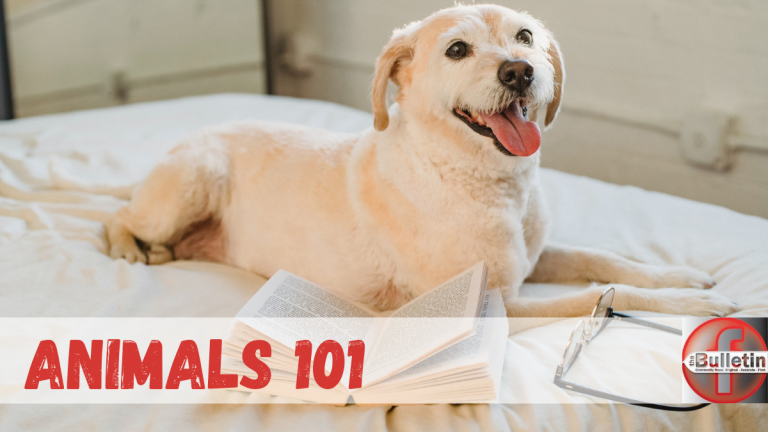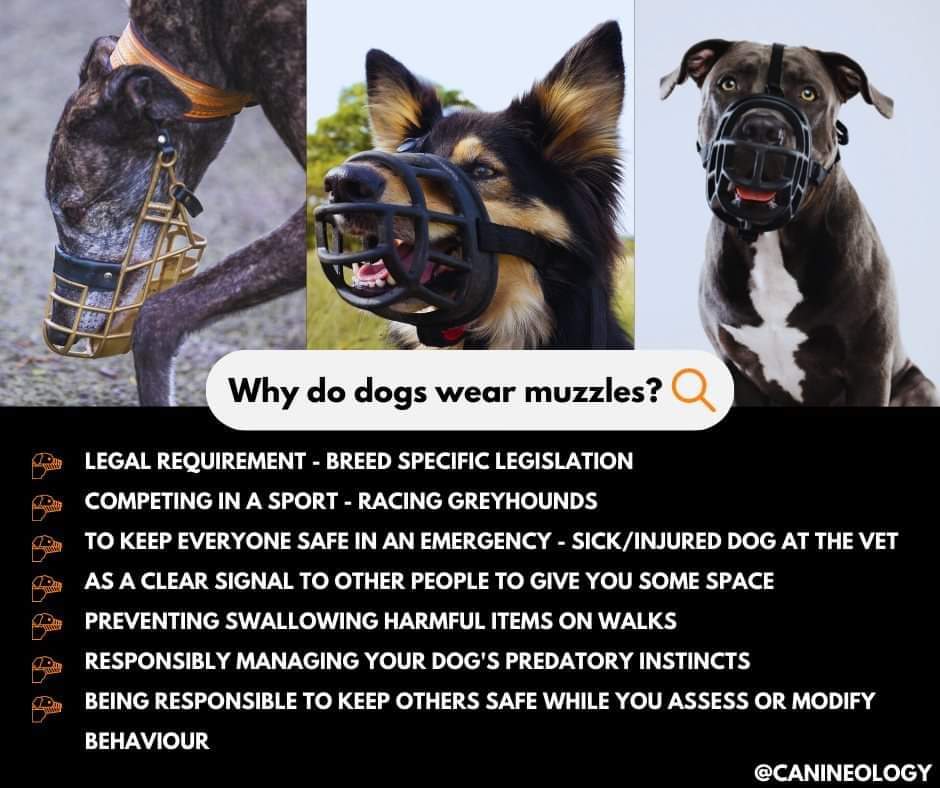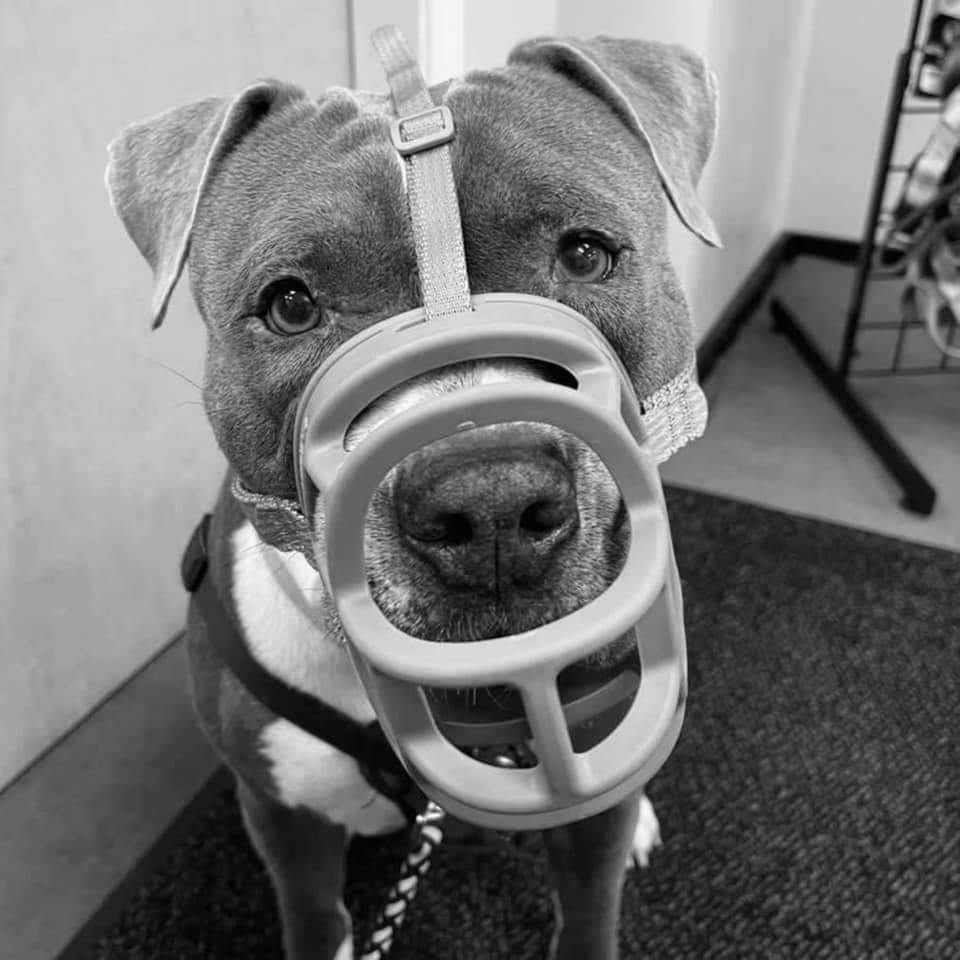
THE MUZZLE DOG STIGMA NEEDS TO CHANGE AND THAT HAPPENS THROUGH BETTER UNDERSTANDING.
Back in February 2021, a post by Jeremy Mansfield did the round about his dog in a soft muzzle without explaining much. You couldn’t believe the outrage about the post and not one person asked the question of why his dog was muzzled. Those who did their homework before commenting would know that he has raised millions of rands and has been acknowledged as a champion locally and internationally for his work for animal rights.
He later responded that apart from being hurt about the fact that people would think he would hurt animals, he maybe should have explained better. In his case, she was a rescue who came to them with a fractured jaw. She was certainly not muzzled because she carries toys out of the house, he would not do that! She had to wear a soft muzzle that allows her to eat and drink and pick stuff up but keeps her jaw in place so it heals properly. I assume she is not muzzle anymore, but sadly Jeremy passed away in late 2022.
Also read about your pets and your will.
As Helen St.Pierre, owner of No Monkey Business Dog Training says: “Muzzled dogs are not bad dogs. Muzzled dogs have good humans. Muzzled dogs can have more experiences because they are managed. Muzzled dogs can still have treats. Muzzled dogs are not miserable.”

LET’S LOOK AT REASONS DOGS MIGHT HAVE TO WEAR A MUZZLE
Big dogs, small dogs, and all breeds and sizes may need muzzles sometimes. It is not only a breed-specific tool. Here are just a few of the many reasons all dogs should learn to be comfortable in a muzzle shared by Sarah Knight dog training and others.
- Accidents happen – When you treat an animal in an emergency, one of the first things you are taught is to muzzling them. The reason: Any animal in pain or distressed can bite, even if they are a sweetheart otherwise. Need to remove 100 cactuses from your dog? Need to carry your dog with a broken leg down a mountain when on a hike?
- Helps prevents blockages – Some dogs like to pick up and eat bones, sticks, dead animals etc., on a walk. No pet parent loves dealing with emergency vet blockage surgery or cleaning up vomit all night. Dogs that love to gulp down treasures on trails are great candidates for muzzle training.
- Vet care – Even if your dog is well-behaved/trained, there might come a time when a muzzling them at the vet might be necessary. It lowers the nervous energy of some vet techs, vet and for your dog. Your vet will likely be very grateful too.
- Grooming– Whether their nails need to be clipped or a shave, pets need grooming. As dogs age and their bodies get older and more painful maintenance grooming can start to hurt. Pain may cause your dog to growl, snap or bite. Your groomer may feel more comfortable with handling part of the groom with your dog muzzled.
- New dog introductions & interactions – Sometimes some dogs need a little extra help with dog-on-dog interactions. Muzzling helps keep them and others safe and might also help the owners be more confident, which in return benefits the dog’s experience.
- Evacuations – It doesn’t matter where you live, emergencies and evacuations may happen. If you aren’t home and a rescue team is sent in for your pets they may be crated and or muzzled. Also read about having an emergency plan for your pets.
- Aggression or rough play – Some dogs may just play too rough or may be more aggressive. You still need to work with an ethical behaviourist to address it, but muzzling can be useful.
- Breed-specific legislation – There might be areas which require certain so-called “dangerous breeds” to wear them when not on private property.
- Injury recovery – As in the case of Jeremy’s dog, sometimes a muzzle can be helpful when recovering from an injury.
- Training – Sometimes muzzling can be a temporary solution while you are busy with behaviour modification training.
I do not support the muzzling of dogs who compete in sports because I do not support the practice of exploiting animals for entertainment. When they are muzzled for this reason, I do not consider it an ethical reason for muzzling, although it will keep those competing safe.

For me, muzzling should not be a permanent solution and if there is a behavioural issue, please address them by working with an ethical behaviourist (maybe a trainer). Ask your vet or local behaviourist which is the best muzzle for your pet as there are different ones. Pack one when you travel or hike, go to the vet or groomer and include it in your emergency or first-aid bag.
Lose the stigma about muzzling and keep in mind that if someone uses one on their dog, it is a responsible, proactive owner who most likely values the confidence and safety of their dog and others around them. Provide space but don’t assume the dog is a “bad dog” or having a “hard time”. If you see a dog in a muzzle, don’t stare! If you are concerned, engage positively with the owner instead of judging! If you are still concerned, contact your local SPCA to investigate.
Is your dog comfortable in a muzzle? I believe all dogs should be comfortable in a muzzle. Include muzzle and crate training in your puppy training schedule, but also start with your older pets if you haven’t yet. It can make a big difference in an emergency.
Next week we will look at what are some normal dog behaviours.
WHEN YOU KNOW BETTER, DO BETTER!
I am glad it helped you. You can search Animals 101 on this site for various articles. This is currently our only muzzle related article, but there are many behaviour, body language, and care topics too.